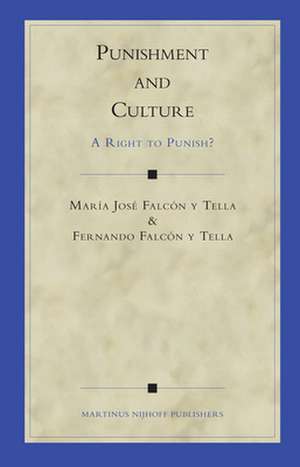Punishment and Culture: A Right to Punish?
Autor María José Falcón y Tella, Fernando Falcón y Tellaen Limba Engleză Hardback – 22 mar 2006
Moving from the most abstract and general to the most concrete and specific, various themes relating to the concept of punishment are distinguished. These themes are not exactly equivalent but are, nevertheless, often confused with one another. They are: Punishment; Punitive Practice; Sentence and Penalty. Of these the third – Sentence, which is almost the least generic concept dealt with, having to do with that area of law which basically constitutes Criminal Law – forms the central part of the work. In this section, via a dual structure, the distinction is made between punishments and deterrents, as the prime types of punitive practice, with a distinct historical tradition, diverse bases and functions, around which different sorts of theories and schools have developed.
The book ends with a series of critical conclusions as to what, in the opinion of the authors, should be a correct conception of punishment.
Preț: 628.46 lei
Preț vechi: 766.42 lei
-18% Nou
Puncte Express: 943
Preț estimativ în valută:
120.26€ • 128.60$ • 100.27£
120.26€ • 128.60$ • 100.27£
Carte indisponibilă temporar
Doresc să fiu notificat când acest titlu va fi disponibil:
Se trimite...
Preluare comenzi: 021 569.72.76
Specificații
ISBN-13: 9789004151499
ISBN-10: 9004151494
Pagini: 267
Dimensiuni: 155 x 235 x 23 mm
Greutate: 0.65 kg
Editura: Brill
Colecția Brill | Nijhoff
ISBN-10: 9004151494
Pagini: 267
Dimensiuni: 155 x 235 x 23 mm
Greutate: 0.65 kg
Editura: Brill
Colecția Brill | Nijhoff
Notă biografică
María José Falcón y Tella is Professor of Legal Philosophy (from 1991) and Director of the Institute of Human Rights (from 1998) at the Complutense University of Madrid. She is the author of 14 books - on topics such as Analogy and Legal Argumentation (1991), Validity of Law (1994, 1998, 2000), Civil Disobedience (2000, also by Brill Publishers, 2004), General Theory of Law (2001, 2003), Punishment (2005) and Equity (2005)- and many articles in specialized Spanish and other Reviews. Some of her works have been translated into different languages. She spent several periods abroad doing research at the Universities of Bologna, Paris, Brussels, Louvain, Harvard, Berkeley, Cologne, Oxford and Frankfurt, inter alia. She was awarded "The National Prize of Studies in Law" in 1987 and "The Extraordinary Doctoral Thesis Prize" in 1989.
Fernando Falcón y Tella is Doctor in Law (2003) and Assistant Professor at the Faculty of Law of the Complutense University of Madrid. He is author of a monograph about Threedimensionalism in Law (2004) - the topic of his Doctoral Thesis - and another on Punishment (2005), and many articles in Spanish and other Reviews. He spent periods researching at the Universities of Paris, Geneva and Oxford. He held a research scholarship awarded by the Spanish Ministry of Education for its Research Fellow's Training Scheme.
Fernando Falcón y Tella is Doctor in Law (2003) and Assistant Professor at the Faculty of Law of the Complutense University of Madrid. He is author of a monograph about Threedimensionalism in Law (2004) - the topic of his Doctoral Thesis - and another on Punishment (2005), and many articles in Spanish and other Reviews. He spent periods researching at the Universities of Paris, Geneva and Oxford. He held a research scholarship awarded by the Spanish Ministry of Education for its Research Fellow's Training Scheme.
Cuprins
Preface;
Chapter I Scope of the Work;
Chapter II Punishment in General;
Chapter III Punishment in Law as a Reflection of Its Coercive Character;
Chapter IV Punishment in Criminal Law. Differences with Deterrents;
Chapter V Punishment in Other Spheres Distinct from Criminal Law;
Chapter VI Conclusions;
Chapter VII Bibliography;
Index.
Chapter I Scope of the Work;
Chapter II Punishment in General;
Chapter III Punishment in Law as a Reflection of Its Coercive Character;
Chapter IV Punishment in Criminal Law. Differences with Deterrents;
Chapter V Punishment in Other Spheres Distinct from Criminal Law;
Chapter VI Conclusions;
Chapter VII Bibliography;
Index.
